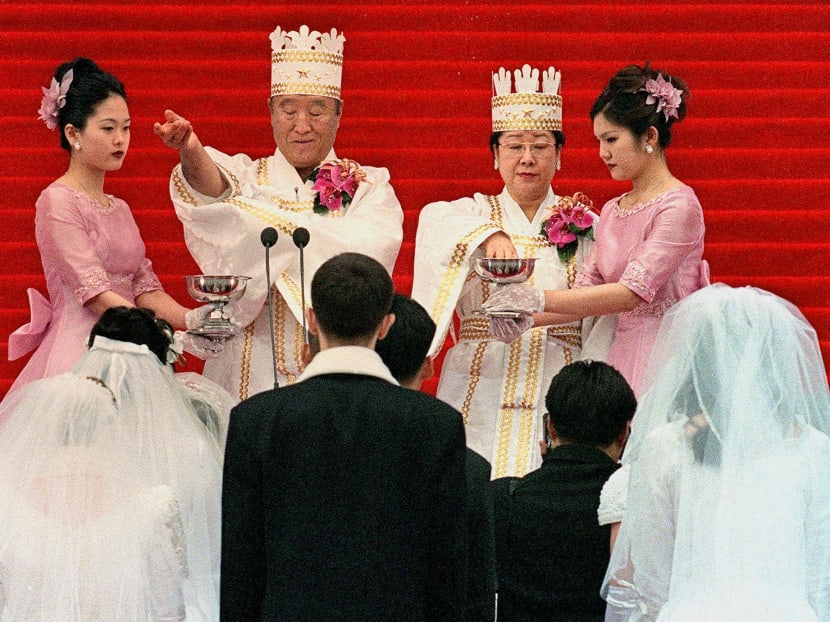South Korea: A cult history
SEOUL — The current political scandal engulfing South Korean President Park Geun-Hye has been given a lurid twist by numerous but largely unsubstantiated reports of links to religious cults and shamanist rituals.

Sun Myung Moon (second to the left), founder of the Unification Church, and his wife (second to the right) bless the brides and the grooms in a mass wedding ceremony at Chamsil Olympic Stadium in Seoul Feb 13 2000. The Unification Church, also known as Moonie, was among the cults that exists in South Korea. Photo: AFP
SEOUL — The current political scandal engulfing South Korean President Park Geun-Hye has been given a lurid twist by numerous but largely unsubstantiated reports of links to religious cults and shamanist rituals.
Although Ms Park has denied the reports, they have resonated in a country with a history of cult organisations and charismatic religious leaders — some of whom have amassed enormous wealth and influence.
Here are five questions about religious practices in South Korea, the influence of shamanism and why the country has proved such fertile ground for cults to flourish.
WHY ARE CULTS IN THE NEWS?
Ms Choi Soon-Sil, the woman at the centre of a political scandal surrounding her friendship with President Park Geun-Hye, is the daughter of late religious leader Choi Tae-Min.
In the early 1970s, Choi Tae-Min established his own church, Yeongsegyo (“Spiritual Life”), combining tenets of Buddhism, Christianity and shamanism.
He became a mentor to a young Ms Park Geun-Hye and some media reports have suggested that his daughter and Ms Park became followers and continued to conduct certain shamanist rituals together after his death in 1994.
Ms Park unequivocally denied the reports in an address to the nation on Friday (Nov 4).
HOW RELIGIOUS ARE SOUTH KOREANS?
In the last national census to include religious affiliation, conducted in 2005, close to 30 per cent of South Koreans identified themselves as Christian, compared to 23 per cent who cited the once-dominant Buddhism.
Korean Christianity is particularly muscular and evangelical, sending more missionaries abroad than any other country apart from the United States.
Churches, big and small, have proliferated across cities like Seoul and some are extremely wealthy with large congregations whose members hand over up to 10 per cent of their salary every month.
The traditional spiritual practice of shamanism, which dates back centuries and is deeply ingrained in Korean culture, underpins organised religion.
Many Koreans, young and old, still seek the advice of a shaman on issues ranging from education to marriage and business prospects.
WHAT ABOUT THE CULTS?
There’s no reliable data on how many cults currently exist in South Korea, but there are a large number of fringe churches and groups — estimates range from dozens to several hundred — who have attracted the label.
Some have been implicated in fraud, brainwashing, coercion, and other behaviour associated with cults worldwide. The most sinister have been linked to criminality as serious as systematic rape.
Many groups are Messianic, with a charismatic leader claiming a god-like status, and also highly Korea-centric, espousing a form of spiritual nationalism with the Koreans as God’s chosen people.
According to Mr Park Hyung-Tack, president of the Korea Christian Heresy Research Institute, there are currently around 50 religious leaders in the country who claim to be “either Jesus, the second coming or God himself.”
ANY EXAMPLES?
Many.
One of the largest and best-known is Providence or Jesus Morning Star (JMS) — founded by Mr Jung Myung-Seok in 1980 as a breakaway from the Unification “Moonie” Church.
In 2009, Jung — who referred to himself as the Tree of Life — was jailed for 10 years for the rape and sexual assault of four female followers.
Another group, Guwonpa “Salvation Sect”, came to national attention in 2014 when its leader, Yoo Byung-Eun, became the target of a nationwide manhunt.
Yoo and his family ran the firm which operated the Sewol ferry that sank in April 2014, causing the loss of more than 300 lives — most of them children.
On the run from charges of corruption and negligence, Yoo’s body was found in a field — so badly decomposed that an autopsy failed to determine the precise cause of death.
In 1987, 32 followers of an apocalyptic cult called Odaeyang were found dead at their headquarters in an apparent murder-suicide pact. Among them was the cult’s leader Park Soon-Ja who was under police investigation for embezzlement.
WHY IN SOUTH KOREA?
There are numerous theories but a number of experts suggest cults (and religion in general) flourished during traumatic periods in modern Korean history — the 1910-45 Japanese colonial period, the 1950-53 Korean war and the decades of military rule that followed it.
Religious groups with strong, unambiguous ideologies that offered comfort and salvation appealed strongly to people struggling with a crisis of national identity during times of deep uncertainty.
The more modern versions have claimed a unique knowledge of the path to material and spiritual prosperity — a message that resonates in a highly competitive and status-focused society. AFP









